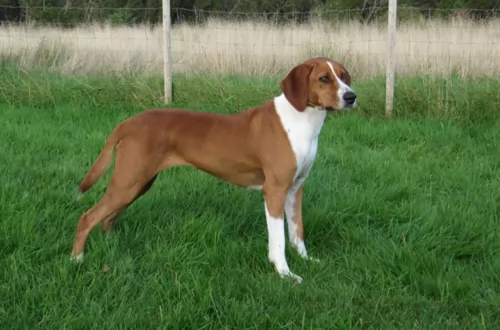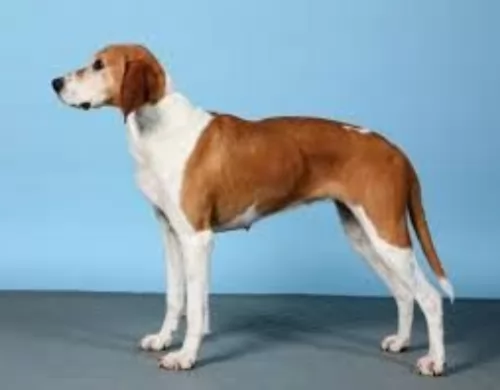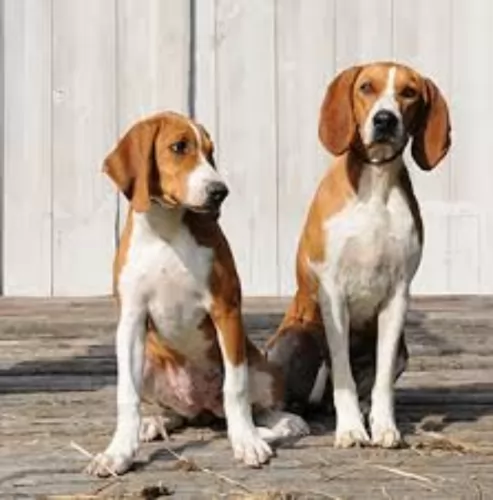 Petzlover
Petzlover English Coonhound is originated from United States but Hygenhund is originated from Norway. English Coonhound may grow 8 cm / 4 inches higher than Hygenhund. Both English Coonhound and Hygenhund are having almost same weight. English Coonhound may live 3 years less than Hygenhund. Both English Coonhound and Hygenhund has almost same litter size. English Coonhound requires Low Maintenance. But Hygenhund requires Moderate Maintenance
English Coonhound is originated from United States but Hygenhund is originated from Norway. English Coonhound may grow 8 cm / 4 inches higher than Hygenhund. Both English Coonhound and Hygenhund are having almost same weight. English Coonhound may live 3 years less than Hygenhund. Both English Coonhound and Hygenhund has almost same litter size. English Coonhound requires Low Maintenance. But Hygenhund requires Moderate Maintenance
 The interesting thing about the English Coonhound is that he originated in the United States, in the southern states. It is also called the American English Coonhound and recognized as such by the AKC. Its ancestry however is British coming from the hunting hounds- the Foxhounds- that were brought to the United States from England in the 17th and 18th centuries and were the base for the Virginia Hounds. These hounds came from dogs that were imported for George Washington, Thomas Walker and Robert Brooke. These Virginia Hounds were then developed into the English Coonhound.
The interesting thing about the English Coonhound is that he originated in the United States, in the southern states. It is also called the American English Coonhound and recognized as such by the AKC. Its ancestry however is British coming from the hunting hounds- the Foxhounds- that were brought to the United States from England in the 17th and 18th centuries and were the base for the Virginia Hounds. These hounds came from dogs that were imported for George Washington, Thomas Walker and Robert Brooke. These Virginia Hounds were then developed into the English Coonhound.
A dog was needed that could handle the rougher terrain of the United States and hunt American Red Fox and racoons. Interestingly it was England, through the UKC, that first recognized the breed in 1905, labeling it the English Fox and Coonhound. The AKC recognized it in 2011.
Development of this group of hounds continued when the Treeing Walker Coonhound was split off as its own breed in 1945, and the Bluetick Coonhound followed in 1946. The English Coonhound can tree a prey or corner it until the hunter arrives. They hunt in packs or they can work one on one with the hunter. Either way they excel at finding and holding their prey “at bay”.
 The Hygenhund is a hound from Norway that was developed in the early 1800’s by the Norwegian breeder Hygen. It was developed for hunting small game such as fox, rabbit, hare or racoon. It is known for its endurance and ability to survive travel across vast artic land without fatigue. It was developed by crossing several Norwegian hounds with ones from England and Germany. This includes basset hounds, holsteiner hounds, beagles, Bloodhounds, Scandinavian hounds and English Pointers. The resulting Hygehound is a scent hound whose popularity fell in the 20th century. Most of the remaining dogs today are located in Norway. The Norwegian Kennel Club and the UKC have both recognized the breed yet its numbers remain low. Even at that the breed today remains a great hunting dog but it is also a great companion or family dog.
The Hygenhund is a hound from Norway that was developed in the early 1800’s by the Norwegian breeder Hygen. It was developed for hunting small game such as fox, rabbit, hare or racoon. It is known for its endurance and ability to survive travel across vast artic land without fatigue. It was developed by crossing several Norwegian hounds with ones from England and Germany. This includes basset hounds, holsteiner hounds, beagles, Bloodhounds, Scandinavian hounds and English Pointers. The resulting Hygehound is a scent hound whose popularity fell in the 20th century. Most of the remaining dogs today are located in Norway. The Norwegian Kennel Club and the UKC have both recognized the breed yet its numbers remain low. Even at that the breed today remains a great hunting dog but it is also a great companion or family dog.
 The English Coonhound is a medium sized dog with a domed head and a deep chest. His build is very athletic. He has dark eye and low-hung ears. The coats of the English Coonhound are extremely variable. For the most part there are three distinct types – the Redtick, the Tricolor and the Bluetick. They can be in any of these categories and have ticking of any color. The most predominate of this group is the Red. So, predominate is the red that the breed is often called the Redtick Coonhound by many.
The English Coonhound is a medium sized dog with a domed head and a deep chest. His build is very athletic. He has dark eye and low-hung ears. The coats of the English Coonhound are extremely variable. For the most part there are three distinct types – the Redtick, the Tricolor and the Bluetick. They can be in any of these categories and have ticking of any color. The most predominate of this group is the Red. So, predominate is the red that the breed is often called the Redtick Coonhound by many.
 The Hygenhund has a solid rectangular and compact body with muscular and compact legs and paws. Their heads are shaped like a triangle with dark eyes and a broad skull. The muzzle and neck are long and the topline is even. They carry their tail high, but they do not curl it over their back. They are a medium sized dog with short hair. They have an overabundance of energy and get bored easily. They can come in black with chestnut or white markings, yellow and red, chestnut without or with black markings.
The Hygenhund has a solid rectangular and compact body with muscular and compact legs and paws. Their heads are shaped like a triangle with dark eyes and a broad skull. The muzzle and neck are long and the topline is even. They carry their tail high, but they do not curl it over their back. They are a medium sized dog with short hair. They have an overabundance of energy and get bored easily. They can come in black with chestnut or white markings, yellow and red, chestnut without or with black markings.
 The English Coonhound is quiet when at home and loud when hunting. They love to cuddle up on a couch and they are great pets. However, they still have a very high prey drive and need a lot of exercise as previously mentioned. They love kids and will be very loyal, hoping to please you all the time. They are curious and if left alone can be destructive. They can also be stubborn and strong willed, and they will howl when caged. If you are going to crate them, train them to it from 3 months on.
The English Coonhound is quiet when at home and loud when hunting. They love to cuddle up on a couch and they are great pets. However, they still have a very high prey drive and need a lot of exercise as previously mentioned. They love kids and will be very loyal, hoping to please you all the time. They are curious and if left alone can be destructive. They can also be stubborn and strong willed, and they will howl when caged. If you are going to crate them, train them to it from 3 months on.
 1. Children friendliness – The Hygenhund is very friendly to children and love to play with them.
1. Children friendliness – The Hygenhund is very friendly to children and love to play with them.
Stamina, intelligence and ability to endure cold climates.
Very adaptable in some ways – enduring cold climates for instance. However, they need a large yard or area to run in. They are not as adaptable in an apartment.
The Hygenhund is very intelligent and a quick learner. They love learning new things.
 The English Coonhound is an exceptionally hardy breed. The only serious situation they regularly face is Bloat. Bloat appears when the dog eats a large meal too fast after exercising or eats too large a meal before exercising. What happens in bloat is the stomach is distended and the intestine can wrap around vital organs and kill the dog.
The English Coonhound is an exceptionally hardy breed. The only serious situation they regularly face is Bloat. Bloat appears when the dog eats a large meal too fast after exercising or eats too large a meal before exercising. What happens in bloat is the stomach is distended and the intestine can wrap around vital organs and kill the dog.
Breeders do test for elbow and hip dysplasia but the is not a lot of this in the breed.
 When feeding your English Coonhound be aware that this athlete loves to eat. You have to keep him from growing obese as his tendency to overeat is high. He uses a lot of energy on the hunt so if he is a hunting dog perhaps he needs more calories. Be careful when and how you feed him so that he won’t get bloat.
When feeding your English Coonhound be aware that this athlete loves to eat. You have to keep him from growing obese as his tendency to overeat is high. He uses a lot of energy on the hunt so if he is a hunting dog perhaps he needs more calories. Be careful when and how you feed him so that he won’t get bloat.
As previously mentioned the American English Coonhound is a very hearty breed and its most serious issue is Bloat. However, they also have long, floppy ears.
Because they were bred to hunt they need a lot of daily exercise. Jogging, brisk walking, or playing at t dog park are good activities for him. If they don’t get enough energy they become high strung and can engage in destructive behavior. Don’t let them off leash as they might wander off after any scent they capture. They love to chase a ball and you’ll wear out before they do. He might be good at lure chasing.
 Since the Hygenhund is such a high energy working dog feed a high quality food. Feed 3-4 times a day for a total of 2.3 cups.
Since the Hygenhund is such a high energy working dog feed a high quality food. Feed 3-4 times a day for a total of 2.3 cups.
Again this is a high energy dog. Feed a high protein good quality dog food twice a day for a total of 3-4 cups.
Good speed and stamina. Good in cold climates.
The Hygenhund needs plenty of exercise to dissipate all its working energy. They will excel at field trials, lure coursing, fly ball, tracking, and agility.